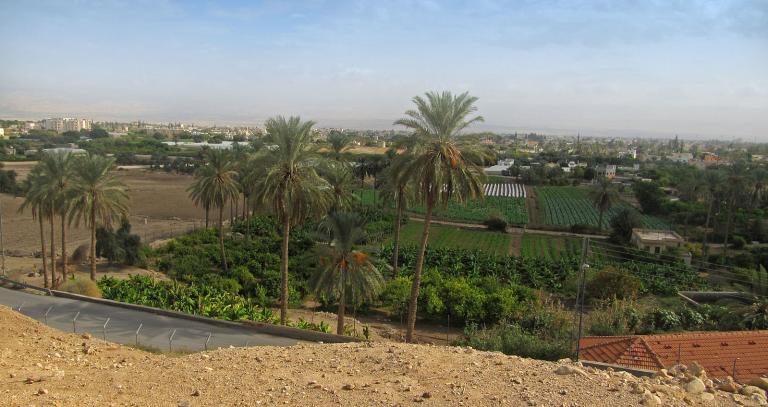
In response to my blog entry of a few days ago on the question “Do Christians and Muslims worship the same God?” one reader responds “Definitely not!”
He elaborates: “In no way can Allah be equated with Elohim and Jehovah. That dog simply does not hunt.”
Actually, though, it’s a pretty good hunting dog:
“‘Allah’ is not pagan term — it means ‘God'”
“The true Godhead,” he explains, “includes two embodied Personages and one as yet unembodied Personage. Allah is described to my understanding as having no body and no “partners”: spouse, parents, or offspring. That pretty well describes Lucifer. . . . It is my opinion that Muslims unknowingly worship Satan.”
So I ask him whether he believes that Jews are Satan worshipers.
“No,” he replies, “and it is a pretty long stretch to jump to that conclusion.”
But it’s not. The God of orthodox mainstream Judaism also has no body and no “partners,” no spouse, parents, or offspring. If that “pretty well describes Lucifer” in the case of Islam, it must consistently also pretty well describe Lucifer in the case of Judaism.
Now, I realize that the concept of “worshiping the same God” is just a bit ambiguous. In a real sense, each of us — based upon differences in background, personality, psychology, upbringing, personal history, education, and so forth — worships a “different” God. And each denomination and each theistic tradition worships a “different” God. Christians believe in a God who is, in some manner, trinitarian. Jews and Muslims don’t. And the list goes on and on and on.
But different perceptions of a person don’t create distinct persons. I may think that Vanessa is Frank’s daughter, whereas she’s actually Bob’s. I may think that Jim is kind while, unbeknownst to me, he’s actually very cruel to his wife and his children. But the individual in question remains the same Bob.
The God worshiped by Muslims created the world in six days, just like the God worshiped by Jews and Christians. He placed Adam and Eve in the Garden, expelled them from it after they yielded to Satan’s tempting, sent the Flood, spoke to Moses and Abraham, and inspired the psalms of David. (He also called and sent sinless Jesus, in agreement with Christian claims and in disagreement with Judaism.) He will resurrect the dead for judgment.
That sounds, to me, like the same God that the Christians worship.
Are the theologies somewhat different? Yes. Of course. But consider an analogy: We’re talking about our old acquaintance Liam O’Sullivan. I remember him as chunky and short, with longish hair and no sense of humor. You’re certain that he was relatively tall, with short hair. And, you insist, he had a very sharp but dry wit. Are we talking about the same guy? Well, when we agree that the Liam we’re talking about graduated from Smallville High School, where he was head cheerleader and student body president, that he went on to study forensic entomology at Gotham City College and then worked for twenty years as the director of humanitarian assistance for the Vito and Carmela Corleone Foundation before accepting appointment as ambassador extraordinary and plenipotentiary to the Duchy of Grand Fenwick, we understand that, beyond a reasonable doubt, we’re talking about one and only one Liam O’Sullivan.
“I note,” says the commenter on my blog, “that we don’t see very many Muslims in our temples. Perhaps that is a powerful clue.”
I’m not quite sure what to make of that remark. I’m pretty sure that I’ve never seen a Buddhist in any dedicated Latter-day Saint temple, either. Or a Methodist, or a Jew, or a Hindu, or a Catholic, or a Zoroastrian, or a Presbyterian, or a Mennonite, or a Quaker.
But my interlocutor argues that the moral differences between Islam and Christianity, between Muslims and Christians, and especially between Islam and the faith of the Latter-day Saints, are so profound as to demonstrate that they worship different deities.
“The Qu’ran,” he says, “is the only ‘holy’ book which calls for the eradication of non-Muslims. How can that irrefutable fact lead one to conclude that they worship the same God you and I do?”
However, the Qur’an doesn’t call for the eradication of non-Muslims.
Speaking of the God worshipped by Muslims, my commenter says that “He calls for the deaths, mutilation, subjugation and taxation of non-Muslims.”
That’s a rather crude oversimplification, at best, but I’ll let it pass for the moment. (It’s a subject that I’ll need to address later.)
“Think,” he urges me, “about all the Muslim-related wars and strife in Muslim and non-Muslim countries alike in the past half century: Iran, Iraq, Kuwait, Saudi Arabia, Yemen, Sudan, Libya, Nigeria, Bosnia, Lebanon, Egypt, Afghanistan, Niger, Chad, Kenya, Jordan, Lebanon, Tanzania, Bangladesh, Pakistan, India, China, Argentina, France, Germany, England, Sweden, and the United States. If I missed any, does it really matter? Islam is truly the Religion of Pieces.”
Well, I can hardly deny the dysfunctionality of the modern Middle East and much of the Islamic world. But is that the direct result of Islam, as such? That would require some evidence and argument. It’s not self-evident.
However, my commenter also calls upon a particular understanding of the future as evidence for his point of view. Speaking of Islam, he writes that “It will constitute a major portion of the forces fighting against Israel af Megiddo.”
This may someday be true. It may not. But, as of now, hypothetical future events and peculiar private understandings of prophecy constitute no actual evidence at all.
To be continued.












